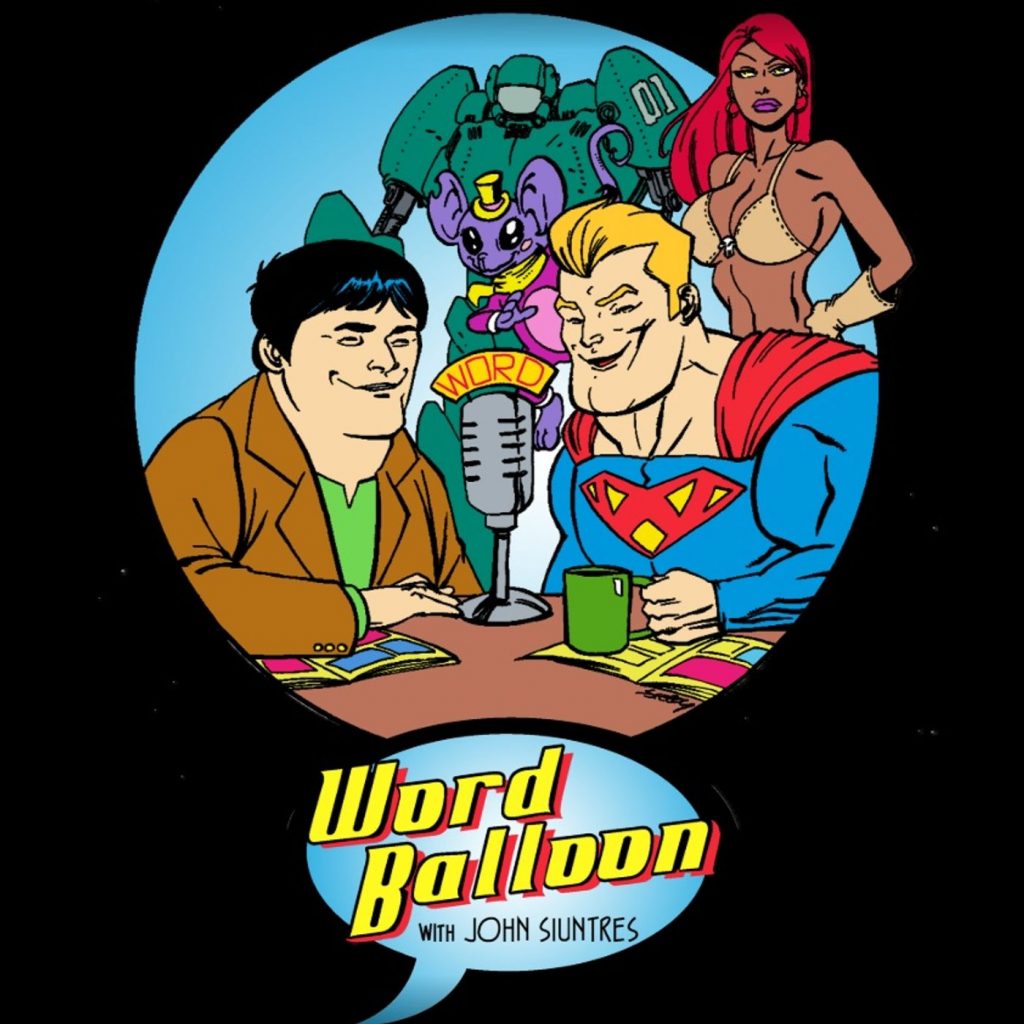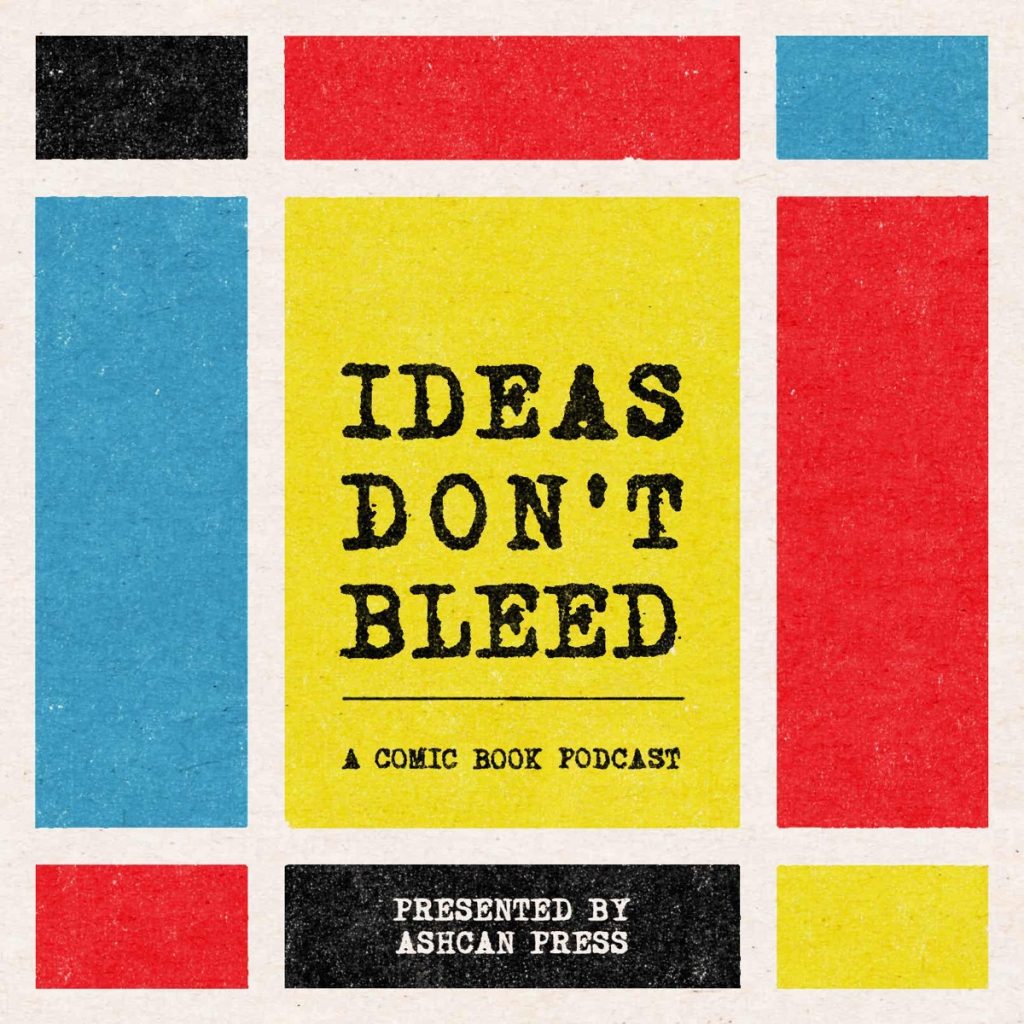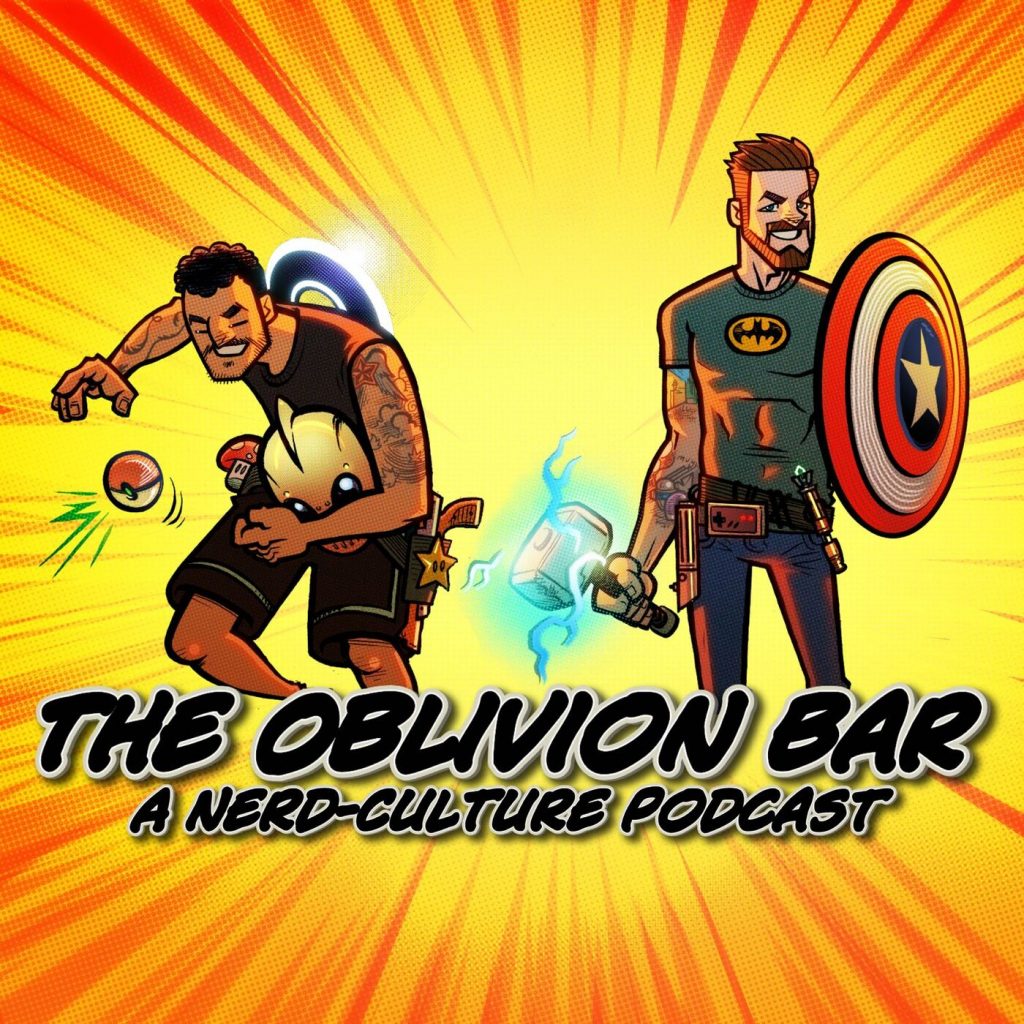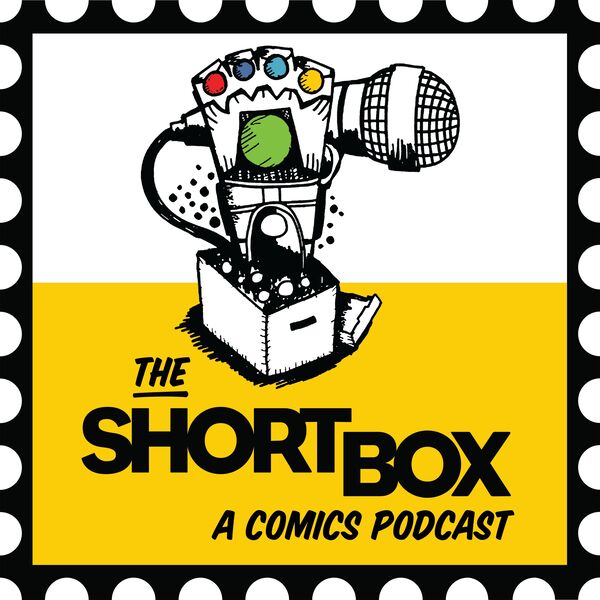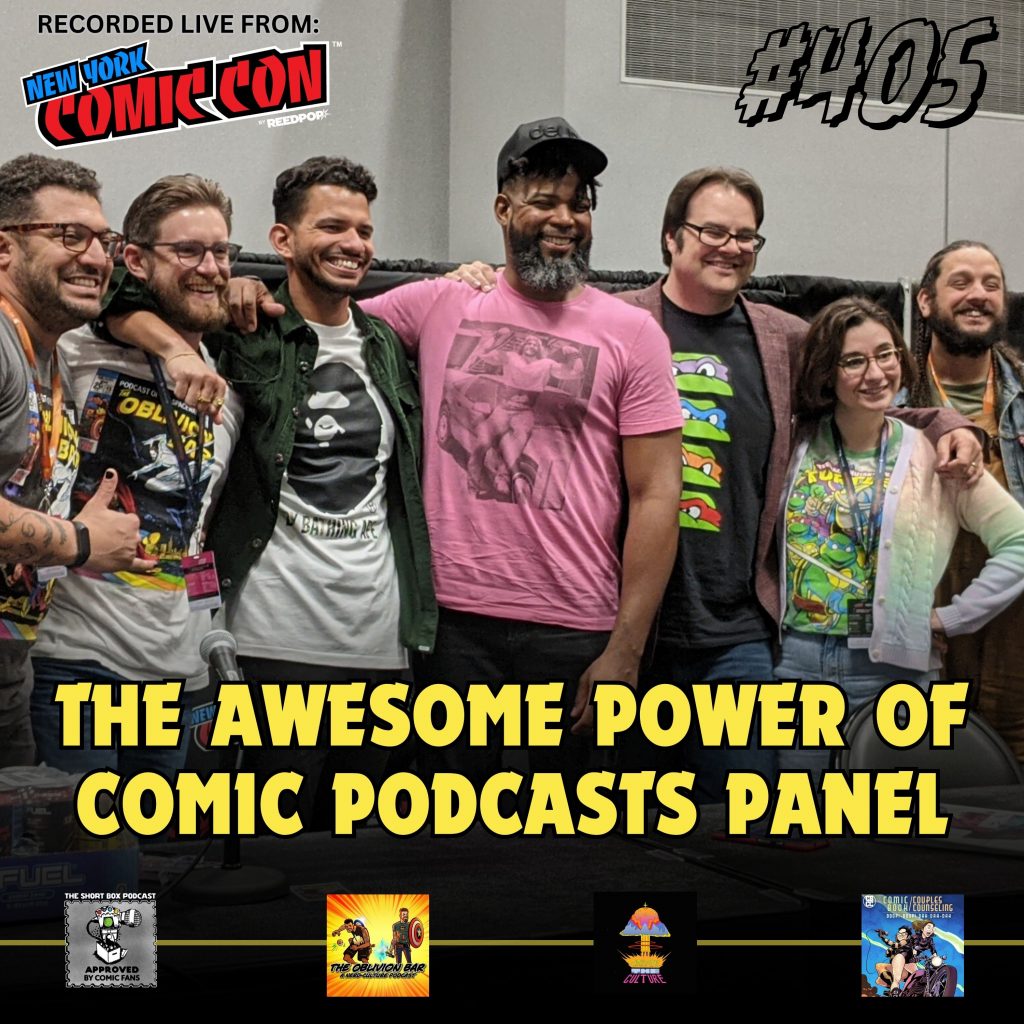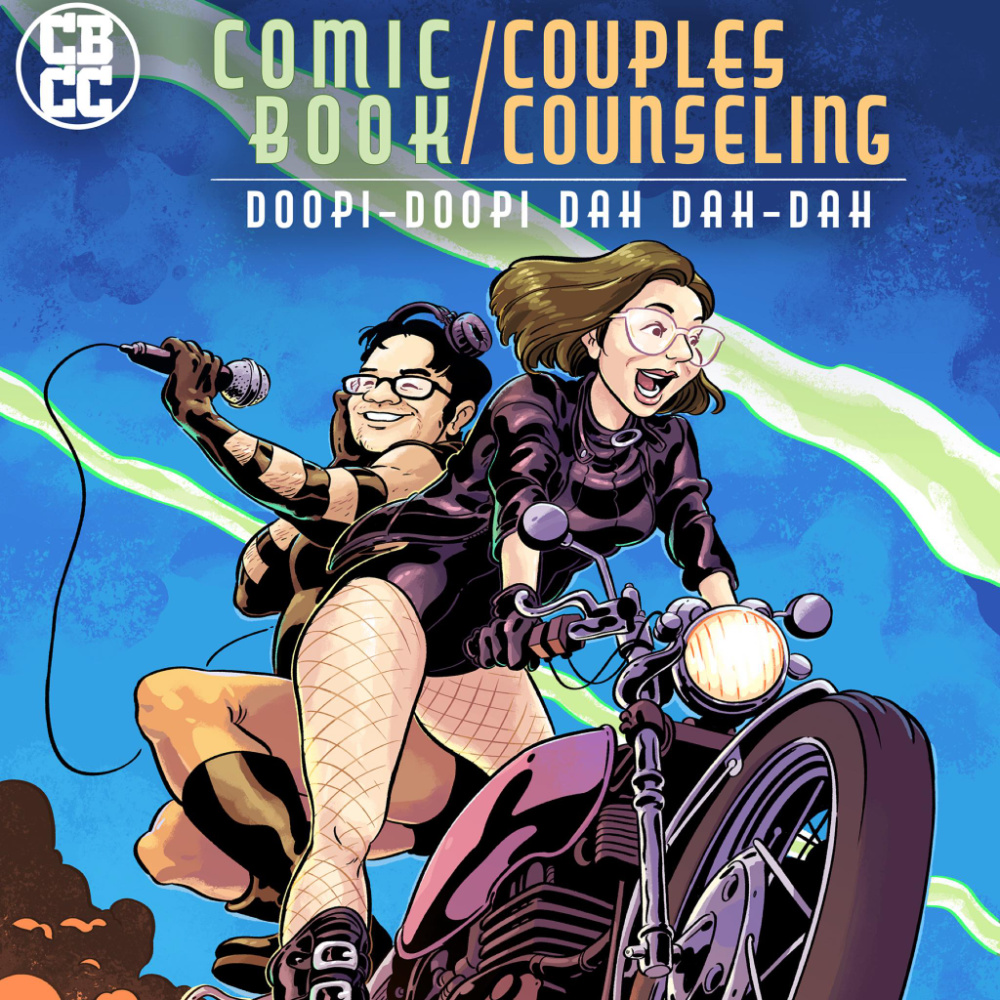“We Want to Have This Conversation with More Than Just Us”: An Exploration of the Connection Between Comics and Podcasts
Comic fans don’t just love reading comics; we love talking about them as well. It’s ingrained into our DNA, a foundational element of how many enjoy the medium. These conversations are even essential to the experience of buying them. Wednesdays are more than when we purchase the latest releases. It’s a day we can discuss our favorite comics and share our hot takes with other customers and the folks who work there. That’s important, if only because many readers don’t have other fans in their lives. Those visits to the comic shop offer them something they might not get otherwise: someone to share their passion with.
Maybe that’s why it’s no surprise there are so many comic podcasts these days: It gives us another place to embrace those passions, and to find like-minded fans in the process.
While an accurate count is impossible, there’s undeniably a sea of shows to choose from, something that seems even more impressive when you consider how many people read comics. The ratio of comic podcasts to readers has always felt unusually high, especially compared to other forms of entertainment. While there are plenty of movie, TV, and video game podcasts, there are also legions of people who routinely engage with those mediums. Comics are popular, but much more niche than other areas of pop culture. But what it lacks in numbers it makes up for in enthusiasm, resulting in innumerable podcasts on the subject.
While certain approaches — interviews, discussions about the week’s releases and news, all things X-Men — dominate, there’s really something for every type of comic fan. Want a manga book club shared amongst friends? Mangasplaining is waiting for you. Looking for deep dive conversations about comic book character relationships? You shouldn’t miss Comic Book Couples Counseling. Craving an inside look at the world of comic book creators? There are plenty of options, but Rob Liefeld’s Robservations arguably leads the way. There are an incredible number and variety of shows to choose from. Maybe that’s why these podcasts are an increasingly vital part of the comic book zeitgeist. It’s where many fans find someone to share their love of comics with, and a crucial guide to discovering the next big thing.
As a fan of comics and the host of my own podcast in Off Panel, my interest in this world has only grown alongside the marriage between comics and podcasting, especially after the pandemic boom for both. I found myself wondering why there’s such an overlap between the two, and what all goes into surviving or even thriving in this space. While these shows feel like a natural extension of those comic shop conversations, it had to be more than that. So today, that’s what we’ll be digging into, as we’ll be exploring comics at the intersection of podcasts — with insight from some of the folks who know it best.
Everyone has their own reasons for starting a podcast, whether it’s about comics or anything else. For most people, though, it starts with being a listener. You find a show you love and think, “I could do that.” That’s true for most, but not all. It certainly wasn’t for John Siuntres, the host of Word Balloon, a comics interview podcast that began in May of 2005. He wasn’t an avid listener yet, if only because podcasts barely existed then. 1
Siuntres had heard a few shows and read an article on the subject, and those experiences spawned an idea. As someone who had worked in radio, he thought to himself, “If I started a podcast, I could generate interview tape and use that to get a better broadcasting job.” It was a means to an end, not something he expected to eventually become a full-time gig.
But from the beginning, he believed comics podcasting had great potential, if handled properly. His guiding light was treating “comic books the way other mediums are treated.” He believed that “they deserve the same attention and the same in-depth interviews that film, television, and novels get.” All he needed was the will to take that path, because the people who listen to podcasts and think, “I could do that” aren’t totally wrong. There is a double-edged sword element to that, of course. As Siuntres told me, “That is the best and worst thing about podcasting. Anybody can do it.” But how easy it is to create them is an essential part of why so many start their own show — if you can get over your own reasons to not do one.
“You can create a list to prevent you from doing a podcast,” said Brad Gullickson, the co-host of Comic Book Couples Counseling (CBCC). “But if you have a recorder of any kind, you can start making and publishing a podcast today.”
That’s how Brad started CBCC with his wife, Lisa. The pair had been working as freelance film journalists while co-hosting a different podcast with friends, but “it was hard to make space for yourself in film,” according to Lisa. They had discussed starting their own comics podcast, but the question became, what would it be about?
That’s when Lisa, fueled by a “private rabbit hole of self-help books” and a comic book book club she shared with friends, pitched the title of the show.
“We were on a walk when she said Comic Book Couples Counseling, and the moment she said those words, I went, ‘Huh,’” said Brad.
The pair are much different readers, with Brad being a font of comic book trivia while Lisa prefers to “talk about stories as they apply to me.” So, the pair met in the middle, creating a deep dive show that emphasizes “what you can make” rather than “what you know,” per Lisa. It resulted in a comics podcast that’s much more inclusive. That’s important, because building connections is a huge part of why comics and podcasting work so well together.
“Comics and nerd culture in general is all about connection. Think about how many people in your daily life are into the medium as much as we are. For me personally, that’s no one,” shared Chris Hacker, the co-host of the comics and pop culture podcast The Oblivion Bar. “That ties perfectly into why comic book podcasts are so popular now.”
The Oblivion Bar launched during the pandemic surge for podcasts, as Hacker and his best friend Aaron Knowles started it “while we were all sitting at home” in April 2020. Hacker and Knowles were in the army together and liked a lot of the same things, and the show gave the pair something to share and the opportunity to build a community in the process.
That word — “community” — is another key to the comics and podcasting story. So many comic fans lack someone to share their passion with. But by spending an hour or so with your favorite comics podcast each week, you can build a relationship of a sort with others who love the same thing you do. It can make you feel like you’re a part of something.
It helps that comic fans are naturally curious about the medium and its stories, as well. The Short Box’s Badr Milligan believes that’s a real driver of why so many readers start their own podcasts.
“We want to know how things are made,” Milligan told me. “If you’re a fan of the medium, you want to know how involved it is. And sometimes a comic can be so good, you’re left scratching your head like, ‘How the hell did they make this? I want to know more.’
“Comic podcasts give not only myself but listeners a bigger appreciation for the medium.”
Milligan’s a podcasting veteran, having started The Short Box back in 2012. That show’s origins stemmed from conversations he’d share with a couple friends at a local comic shop in Jacksonville, one of whom was already a podcaster. The trio was chatting one evening 2 when his future co-host Walt asked a fateful question: “Why don’t we just do this in front of (microphones) and put out a podcast talking about comics?”
From there, the show evolved considerably, oscillating between discussions about comics and interviews with creators. The latter approach is quite popular in comic podcasts, and that’s for several reasons, not the least of which is just how accessible comic creators are relative to professionals in other fields. That’s a key component to the comic book podcast story, at least in the eyes of podcaster slash writer Matthew Rosenberg.
“There are not a lot of people in comics who are up on pedestals,” Rosenberg told me. “You go to a con and you can meet Robert Kirkman, you can meet Brian Bendis, you can meet Walt Simonson. That’s not true if you want to make movies. You can’t go to New York Comic Con and stand in line for an hour and talk to Tom Cruise and Steven Spielberg.”
Rosenberg launched his interview podcast Ideas Don’t Bleed as a way to fulfill the content requirements of the Substack Pro Grant he signed up for. The idea appealed to him both because he “likes comic podcasts” and because touting the work of others was far more attractive than “ceaselessly talking about myself and my work.” Pair that with the isolation of the pandemic fueling a desire to spend time with people from afar and he had a perfect solution to what he needed. And as a writer who has been working in the industry for a while, he had an advantage over other hosts: He just had to text his friends to come on the show.
He’s not wrong about the pedestal idea, though. If you want to interview someone who worked on a comic you liked, it’s often possible to do so. 3 That’s why accessibility is one of the other core reasons there are so many comic podcasts. The distance between creators and fans is much shorter than it is in other entertainment mediums.
Each of the aspects mentioned so far — accessibility, community, connection, curiosity, and ease — are crucial to the overlap between comics and podcasts, with that quintet acting as its pillars for most. But Rosenberg emphasized something else, a belief comic podcasters share with those who write about comics.
“I feel like there’s a lot of aspiring creators in comics podcasting,” Rosenberg said.
He’s not wrong. Brad Gullickson, Milligan, and Hacker all admitted they’d love to make their own comics at some point. 4 They’re almost certainly not alone in that regard. Podcasting gets your foot in the door. It even forges connections that can help you better understand what you’re getting yourself into. But while that’s a factor, it’s not everything for these folks. Sometimes it’s a lot simpler than a path towards a new career. For many, it’s just what Rosenberg said: “They just want to be closer to comics.”
It’s a good thing these folks have plenty of motivation to do what they do, because hosting a comics podcast? It can be an awful lot of work, even if these are side hustles for most. 5 It’s a job, and one that comes loaded with an array of challenges.
Simply producing an episode in a timely manner can be one of the biggest. While Siuntres “rarely edits,” making his turnaround time faster than most, and Rosenberg is free from backend work because he partners with podcast producers 6 Griffin Sheridan and Ethan S. Parker on Ideas Don’t Bleed, those aren’t typical experiences, if the others I spoke to are any proof. Hacker, Milligan, and the Gullicksons exist on the other end of the spectrum when it comes to producing an episode.
That’s because each is hyperfocused on delivering as high quality a show as they can. Doing so takes time. Hacker estimated that a recent hour-long episode with writer Tom King took six to seven hours to edit, and Milligan believes he spends between eight and 12 hours planning, recording, editing, publishing, and promoting each episode. While the Gullicksons don’t edit quite as much — Brad shared that an hour-long podcast takes around two hours — their recording sessions more than make up for it, particularly the couples-centric episodes.
“A couples session generally takes about six hours of just recording time,” Lisa said.
If that was everything, that would still be an incredible amount of work for shows that are often weekly, especially when you factor in time dedicated to scheduling recordings and interviews. But the job is so much more than just the podcast these days. That’s why Lisa told me the CBCC team “can find ourselves pulled super thin sometimes.” You often aren’t just a show but a brand, 7 one bursting at the seams with tasks like live streams, community engagement, promo cutting for TikTok and Instagram Reels, social media management, and so much more. The social media side alone can almost be a full-time gig. The Gullicksons told me I would be “disgusted” and “terrified” if I saw the weekly recap of how much time they spend on their phones. But it’s work that can be critical to growing your audience.
“You can’t just release a podcast into the ether and hope people find it,” Hacker said.
Thankfully, most find that part enjoyable. Take the Gullicksons as an example. Putting those hours in might be a drag for some, but it’s a side of the work they genuinely value. 8
“We love engaging with people. We love starting conversations and going back and forth,” Lisa said. “Social media doesn’t feel like a burden to us.”
It also can make a huge difference. Hacker said his promotional efforts for the episode with King resulted in one of The Oblivion Bar’s most popular entries yet. While it isn’t as easy as dropping a promo reel and suddenly you have a hit, it’s important to do because building an audience can be a real challenge.
“We’re talking about a very niche topic. We’re talking comic books, and then we’re talking comic book podcast listeners,” Milligan said. “Trying to find where they’re at is always a challenge.”
This is especially difficult right after you launch. As Hacker said, “When you first start, you are going to shout into the void for a bit.” Finding a way to connect with new listeners can feel like it’s completely outside of your control, even if you produce a quality show. This problem is exacerbated by the fact that it’s almost impossible to know what success even looks like. There’s no concrete information that helps you understand whether your download numbers are good, bad, or somewhere in-between, and it doesn’t get any easier to contextualize when you’re operating in a smaller, more specialized space like comics. 9 Everyone has a guess as to who is successful, but ultimately, it’s just that: a guess.
Figuring that out is important because everyone would like to make money from their shows. Being able to say your podcast is popular helps you do it. That’s useful because while podcasting is reasonably easy to do, it isn’t free. There are costs for equipment and hosting, at a minimum. You can front that yourself, but doing so quickly drains your funds and desire to do the work. As Milligan told me, “There’s only so far passion and joy are going to drive you until you have to start making it make sense.”
Monetization is a challenge unto itself. Unless you’re a top podcast, the best path to achieving financial stability is leveraging every platform you can think of, really. That’s certainly true for those I talked to. Everyone has their shows on Patreon. Advertising is both desired and carefully managed. Earnings from video views on YouTube help a bit. Some create merchandise for fans to buy. Siuntres is even developing print volumes collecting some of his interviews to create another income stream. These are all potentially effective tactics, and important ones to take on. But it all adds to the time and effort that goes into your podcast.
All this is why it’s important to differentiate yourself. It’s a lot easier to stand out to listeners, advertisers, creators, and everyone else if you have something that separates you from the masses. While Siuntres believes it’s a bit easier to find an audience when your focus is on a narrower subject like comics, there are enough comic podcasts that you need to find your niche within the niche to really connect with people. Part of that is deliberate. Hacker spends a lot of time plotting out each episode and how they might approach interviews differently than others will. But much of it comes down to who you are as a person.
There’s a reason Siuntres’ advice to broadcasting students is often two simple words: “Be yourself.” The reality is you could have the best sounding podcast in the world, but if people don’t enjoy spending time with you, they’re not going to listen. It’s an ongoing trend, according to Brad. His belief is podcasting is headed in the direction of, “Who do you like? Who do you enjoy the company of?”
Embracing who you are and what you want your show to be is something those I talked to found important. It simplifies the job and makes it easier to build connections, even if it can still be difficult to find the angle that separates you from your peers.
While the job of a comics podcaster can be a challenging one, those I talked to are able to persevere for one main reason: They love what they do. And much of that stems from how fulfilling it is to them as creative people.
“It is the closest I will ever feel to being a creator,” Milligan said. “I have this ability to create something that I feel represents my views on comics and what I want to see in the world.”
That’s a feeling most spoke to, especially Siuntres, a veteran of radio and broadcasting. Control can be foreign in that space, at least to some degree. That’s why he appreciates “the ability to do a broadcast style show on my own terms.” While hosting Word Balloon opened up a bevy of opportunities for him, 10 the creative fulfillment the work offers cannot be understated. There’s a joy each feels when completing an episode. While the process can be a grind, one that can make you question why you do it, the end product quickly erases those feelings.
“Every time I sit down and finish one of these shows and put my stamp of approval on it, I am so happy,” Hacker said. “It is extremely rewarding.”
“When you hit publish, there’s something cool about seeing this thing get put out into the world and it’s reciprocated,” Milligan added.
That reciprocation is important as well. While it can feel like hosting a podcast is shouting into the void, as Hacker put it earlier, connecting with listeners is a constant reminder of why you do this. That’s why Lisa emphasized “the community” as the thing she loves the most about the work. She’s not alone in that regard. Just take Off Panel as an example. In the process of putting this article together, I heard from listeners from around the world and across all aspects of the comic industry, including — for the first time! — a fellow Alaskan who hosts a comics podcast. While much of the work of a comics podcast is like what comics creators do, in the sense that it can be an exercise in isolation, it’s also much more than that.
“It is wonderful to get the feedback from the listeners, and it is one of the highest compliments to hear, ‘Wow, forgive me, but I feel like I know you,’” Siuntres said. “They do know us, because they hear us in conversation.”
It isn’t just connections between host and listeners that are forged either. The comics podcasting community can be a tight knit one, something that can create both a little friendly competition and a support network. In fact, at this past New York Comic Con, Hacker, Milligan, and The Gullicksons all appeared on a panel about hosting comic book podcasts, something that wasn’t just born of a shared interest but real friendship.
“We are often communicating and staying in touch, and I am always so happy for my friends when something big happens to them,” Hacker said.
Of course, there’s one other connection that adds to the thrill of the work. Comics podcasters are fans at heart, so getting the opportunity to talk to some of their favorite creators is something they’ll always take joy from. That’s especially true for Hacker, someone who co-hosts his show with his best friend. The pair have shared conversations with luminaries from the broader comics space, something that enriches both their friendship and their experiences as fans.
“It’s not beyond us to know how special that is,” he emphasized.
While those I talked to love the work, it’s, once again, just that: work. More than that, most efforts aren’t rewarded with the kind of money that reflects the time dedicated to it. That’s part of the reason so many of the shows that surged into existence during the pandemic went away just as quickly. For every gigantic, organic success, there are dozens of shows that evaporate before anyone notices them. That’s why I asked each podcaster a big question: What keeps you doing it? The answers varied dramatically by the person. For Siuntres, though, much of it comes down to his interest in the inner workings of the comic book world.
“My innate curiosity about the subject,” Siuntres said about what fuels him, citing the topsy turvy past 25 years in the comics industry as evidence. “It keeps me engaged and excited.”
While the Gullicksons would love to “make more money from” CBCC, according to Brad, he also admitted that they’d still be doing it “no matter what.” That’s both because, as Lisa put it, “it’s what we do for fun,” and because of the good vibes it sends their way.
“People listening and telling us that they’re enjoying what we make is a huge factor in why we’re doing it,” Lisa said. “We have these conversations regardless. But the reason we record them is because we want to have this conversation with more than just us.”
Milligan has been doing his show like clockwork for 12 years. He admits it’s “a little scary” to even “imagine a future where I’m not doing this.” But for him, his desire to keep hosting The Short Box comes down to the opportunities he gets 11 and the pure joy he gets from creating something that’s entirely his own.
“I think that’s why I haven’t stopped. I’ve hit so many crossroads where I could have quit podcasting,” Milligan shared. “But there’s something about having this thing where I get to bring something into the world.”
While most of the podcasters I talked to love what they do, Rosenberg has mixed feelings about hosting Ideas Don’t Bleed. The only reason he started it was because it offered him a path to regular content for his email newsletter. At this point, he’s delivered on what his Substack Pro Grant required of him, so technically speaking, he’s free to move on from the show. And yet, he and his partners in Sheridan and Parker are still at it, and it’s because something changed since they started.
“We realized recently that we just kind of like doing it. I think Ethan and Griffin maybe like it more than I do. There are parts that I like. There are parts that I don’t,” Rosenberg said. “I have an interview tomorrow. No one’s paying us anymore to do it.
“We’re just doing it because I like promoting comics.”
That’s of course one of the core values of comics podcasts. For creators, they’re important because — as Rosenberg noted — they’re hoping “to sell books.” But that’s only one of the two check boxes that factor into his thinking when he’s considering whether to guest on a show. The other is whether he believes he’ll have a good time on it. The quality of conversation means a lot for guests, and for listeners as well.
At their best, these shows tap into the same energy that those comic shop conversations do, and they offer it to people who don’t necessarily have the access or desire to do it in person. There can be power in having a great discussion with your co-host or your guest, especially once it’s shared with your community. It starts as something intimate, a discussion between a small group of people. But once it’s shared, it can become bigger than you could have ever imagined. And there’s magic in that.
Ultimately, though, podcasting about comics is a commitment to creating something that exists as a niche within a niche. While there are highly successful comic podcasts like Jay and Miles X-Plain the X-Men and Cerebro, 12 the big hits are few and far between. A constant theme from these conversations was you have to be happy doing the show for yourself, and you need to realize that there’s power in doing something you love because you love it.
That’s something Milligan learned when he and his fiancé attended a podcast conference in Denver. The pair are the co-founders of Jax Podcasters United, a community built to educate and assist podcasters in the north Florida area. 13 When they went, he realized there was very little programming about hobby-oriented podcasts like The Short Box. The focus of the event was instead on giant brands and celebrities 14 rather than the types of shows that most regular people host or even listen to. As he walked around the halls filled with the glitz and glamour of the major brands posted up at the event, Milligan realized something. While he may operate within a niche, he felt pride talking with others about what he does — a podcast where he embraces what he loves rather than what’s opportunistic.
“There’s a certain badge of honor that comes with being able to say, ‘No, I podcast about comic books,’” Milligan said.
Fun fact: The word “podcast” was only coined the year before he launched.↩
Their conversation was so lengthy it carried into the shop’s parking lot after the store had closed.↩
There are caveats to that idea, and it’s certainly harder to book the biggest names. But for the most part, it comes down to the idea of “If there’s a will, there’s a way.”↩
In case you’re wondering, I have no interest.↩
Siuntres and Brad Gullickson are trying to make their respective podcasts their primary work, but everyone else I talked to has another career.↩
And the writers of Kill Your Darlings at Image Comics!↩
As much as I hate that word, it’s true.↩
Brad emphasized that sharing the tasks as a married couple makes it “way easier,” as well.↩
Brad pointed to Buzzsprout’s data on 7-day episode downloads as a guide, but that’s been around for so long I have no idea if it’s even valid anymore.↩
Including an appearance on the Discovery Channel show Prophets of Science Fiction, which happened because the producers had listened to Word Balloon.↩
He imagined a scenario where he told his 11-year-old self that he’d eventually interview Mark Bagley, the person who did the art for his first Spider-Man comic, and his enthusiasm spilled off the screen as he did.↩
Those X-Men! So popular!↩
The group is nearing 500 members at this point and honestly sounds amazing.↩
Also, his “least favorite” type of show: podcasts about podcasts.↩

